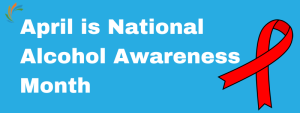April is Alcohol Awareness Month, which focuses on raising awareness and understanding of alcohol misuse. Over time, excessive alcohol consumption can lead to the development of chronic diseases and other serious effects, including quality of life and physical and mental health.
How Alcohol Affects Mental Health
Substance use disorders can be described as harmful habits involving alcohol or other substances that lead to significant disruption in daily life, which decrease functioning and cause considerable distress. Substance use disorders affect an individual's thoughts, emotions, behaviors, appearance and well-being. Well-supported scientific evidence shows that addiction to alcohol or drugs is a chronic brain disease with a course that includes relapse and potential for recovery (Kelly, Saitz & Wakeman, 2016). The brain is still developing until age 26, and substance use can interfere with healthy brain development.
Alcohol is often used to try to decrease symptoms of depression or anxiety, but excessive drinking is likely to make those symptoms worse. People with substance use disorders are likely to have co-occurring mental health challenges. Of the 18.3% of adults ages 18+ of experience mental illness, 3.4% have both a substance use disorder and a mental illness (Hartz et al., 2014). Many people use alcohol or other drugs to “self-medicate” in hopes of reducing symptoms of anxiety, depression, or psychosis. Alcohol can result in intensified feelings of anxiety, depression and anger, inhibit the use of effective coping strategies, and increase the chance of a person acting on suicidal or self-injury feelings.
Seeking Treatment
Substance use disorders are treatable. With research-based treatments, individuals can stop using alcohol and resume productive lives. If alcohol has started interfering with your quality of life, it is time to seek help. Seeking treatment for Alcohol use disorder is not easy, but it is brave and necessary to live a happy, healthy life. Recovery is possible with the proper support and resources. SAMHSA’s National Helpline, 1-800-622-HELP (4357), is a confidential, free, 24-hour service for individuals and family members facing mental and/or substance use disorders. The hotline refers individuals to local facilities, support groups and community-based organizations. Additionally, SAMSHA has an online treatment locator that can help find a treatment facility for people based on the provided zip code. Individuals can call or text 988, a national suicide and crisis lifeline, if crisis support is needed for themselves or their loved ones. No matter the location in the United States, by texting 988, individuals can be connected to a caring, trained counselor who can help.
Centennial Mental Health Center offers Substance Use Disorder treatment throughout Northeast Colorado in a variety of locations. Centennial’s specialists are dedicated to supporting individuals on their paths to addiction recovery through care plans that meet their specific needs. Additionally, Centennial’s prevention team works with schools to teach children and teenagers about the dangers of underage drinking.
Centennial's Substance Abuse Disorder Services include:
- Dialectical Behavioral Therapy Skills (DBT)
- Level II Education
- Level II Therapy
- Minors in Possession Treatment
- Relapse Prevention
- Specialized Women's Treatment
- Special Connections
- Strategies for Self-Improvement and Change
- Seeking Safety Group
- Sober Living Facilities
- UA Monitoring
- Level 4+
- Medication-Assisted Treatment (Suboxone) for Opioid Dependency
For more information on Centennial’s Substance Use Disorder Services, please call your local Centennial office.







